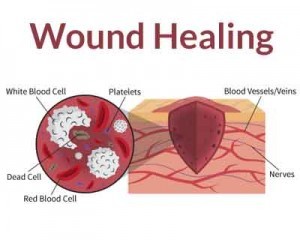- Home
- Editorial
- News
- Practice Guidelines
- Anesthesiology Guidelines
- Cancer Guidelines
- Cardiac Sciences Guidelines
- Critical Care Guidelines
- Dentistry Guidelines
- Dermatology Guidelines
- Diabetes and Endo Guidelines
- Diagnostics Guidelines
- ENT Guidelines
- Featured Practice Guidelines
- Gastroenterology Guidelines
- Geriatrics Guidelines
- Medicine Guidelines
- Nephrology Guidelines
- Neurosciences Guidelines
- Obs and Gynae Guidelines
- Ophthalmology Guidelines
- Orthopaedics Guidelines
- Paediatrics Guidelines
- Psychiatry Guidelines
- Pulmonology Guidelines
- Radiology Guidelines
- Surgery Guidelines
- Urology Guidelines
Why wound healing takes longer as you age

NEW DELHI: Each injury could mean a little more for the elderly -- more impact and more healing time. A new study has now found that the skin's ability to repair itself takes longer as we age because the healing function of sweat glands declines with time.
"We've identified, for the first time, the cellular mechanisms of altered skin wound repair in elderly patients," said study first author Laure Rittie from the University of Michigan.
The researchers compared 18 elderly person's skin to 18 young adults' skin, to see how each group healed from skin lesions.
The lesions were smaller than the diametre of a pencil eraser, performed under local anesthesia.
The researchers had already determined that eccrine sweat glands, which are located throughout the body, are important for wound closure.
They are major contributors of new cells that replace the cells that were lost due to injury. This finding led to a new research question.
"Since we know elderly people tend to sweat less than young adults, we concentrated on this healing function of sweat glands," Rittie said.
In young people, they discovered sweat glands contributed more cells to wound closure than in aged adults.
The cells in aged skin were not as cohesive, either. Fewer cells participating, spaced further apart, means a delay in wound closure and a thinner repaired epidermis in aged versus young skin.
It was not that the sweat glands were less active in older people, rather, that the environment in the ageing skin had been slowly degraded, making the skin structures less able to support the new cells that were generated, the study said.
The findings were published in the journal Aging Cell.
"This tells us that, beyond the frustrating appearance, skin ageing also negatively impacts the ability of the skin to repair itself," Rittie noted.
Next Story
NO DATA FOUND

Disclaimer: This site is primarily intended for healthcare professionals. Any content/information on this website does not replace the advice of medical and/or health professionals and should not be construed as medical/diagnostic advice/endorsement or prescription. Use of this site is subject to our terms of use, privacy policy, advertisement policy. © 2020 Minerva Medical Treatment Pvt Ltd